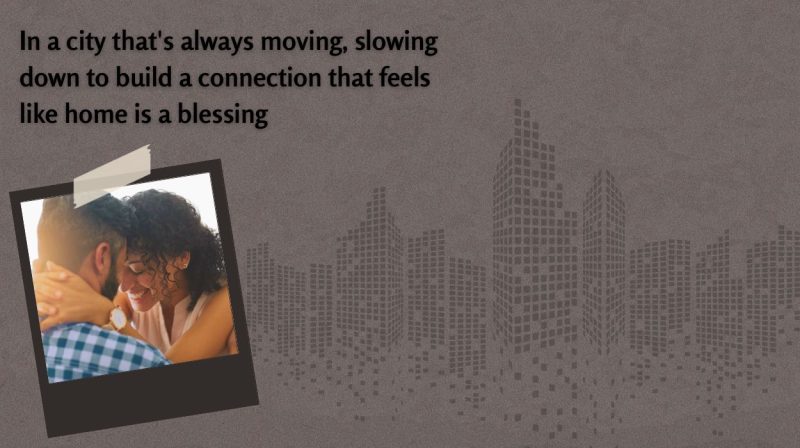Dating in New York feels different the moment you step into it. The city is alive every hour, which means people are constantly moving between work, social gatherings, and personal ambitions. That pace bleeds into relationships. You might find yourself going from a first date to discussing exclusivity in what feels like no time at all. Part of it is the crowded social life. There’s always another dinner, another party, another networking event. And part of it is the unspoken pressure: in a city this driven, expectations around love and commitment can be just as intense as career goals.
This is why clarity matters so much. Without it, you risk being swept up in the rush of someone else’s timeline rather than listening to your own needs. Knowing when to move forward, when to pause, or when to ask hard questions makes the difference between a relationship that grows strong and one that fizzles out under pressure.
In this article, we’ll walk through the relationship stages NYC couples often navigate, from casual dating to exclusivity, cohabitation, and long-term partnership, signs that show you’re truly ready for commitment, the subtle readiness factors you should pay attention to, and expert insights that help make sense of it all. Whether you’re still in the talking stage or weighing a bigger decision, understanding the key NYC romance milestones will give you a clearer path forward.
The Different Stages Of NYC Romance
Table of Contents
Relationships tend to evolve through a series of stages, each with its own dynamics, emotions, and expectations. While not every couple follows the same timeline, most will pass through key phases, starting from the early talking stage, where interest and attraction spark, to casual dating, exclusive dating, and eventually forming a committed relationship. As things deepen, you may move into more serious territory like partnership, long-term planning, or living together.
Understanding these stages helps you identify where you are, where your partner stands, and what conversations may be necessary to keep things aligned. In fast-paced places like NYC, it’s especially important to recognize these transitions so you don’t blur boundaries or skip steps that matter. Each stage offers a chance to check in, reflect, and decide together what comes next. Let’s break down the typical relationship stages so you can move forward with clarity, not confusion.
1. Talking stage

This is the very beginning. You’ve connected, via text or an app, but haven’t defined anything. People in the talking stage might chat all day, learn trivial details about each other, and even go on casual hangouts, yet still have that uneasy, undefined feeling. Hinge’s Logan Ury notes a trend toward comfort with ambiguity in young daters and says, “Many now have less attachment to titles.” In practice, talking means you’re getting to know each other without labels. You’re not sure if you’re “officially dating” yet, so everything is a little casual and open-ended.
2. Dating casually
Once you move beyond texting, you may start dating casually.
- You plan actual dates, but neither of you has explicitly said “exclusively dating”
- You might still meet others or keep options open
- You’re spending significant time together and there’s mutual interest, but it’s still agreed, either explicitly or implicitly, that you could see other people too
This dating phase is about exploration. You’re gauging the connection while still enjoying NYC’s vibrant singles scene.
Related Reading: NYC Relationship Roadmap: Milestones From First Date To Moving In
3. Exclusive dating
When you decide you want to date only each other, you enter exclusive dating. This means,
- You’re no longer seeing other people
- You haven’t necessarily labeled yourselves “girlfriend and boyfriend,” but you’ve agreed on one partner at a time
- You might introduce each other as someone “special” or an exclusive date
- You spend more weekends together, share your routines and maybe even your keys or favorite spots in the city, and don’t hit the dating apps
Exclusive dating is a commitment to test if you’re each other’s person, often just before becoming an official couple.
4. Being in a relationship
This is one of the most significant relationship stages as it indicates that things are taking a turn toward “serious”.
- Calling each other “boyfriend,” “girlfriend,” or “partner” usually happens here
- You’ve agreed not only to date exclusively, but you also see a genuine future together
- You may be discussing moving in together or what to do on holidays
- You know each other’s close friends
- You are openly affectionate and engaging in public displays of affection, posting each other on social media, the whole nine yards.
This relationship stage means you’ve formalized the partnership emotionally and socially.
5. Partnership and commitment

This is when your lives start to merge more fully. It could involve serious steps like,
- Engagement
- Shared finances
- Long-term living plans
You might refer to each other as a “life partner” and make joint decisions like one or both of you relocating jobs to stay together. It’s a deep commitment: you see yourselves as building a life together rather than just sharing dates.
Related Reading: Are You Moving In Together? Checklist From An Expert
6. Moving in
Cohabitation is a big relationship milestone. Many couples take on this step after they feel very secure in their relationship. In NYC, couples often move in after several months or a year of dating. One study found 50% moved in together by about a year. Living together means sharing routines and responsibilities daily, which is a significant shift from just dating. It can bring you closer, but also requires patience and communication about chores, space, and finances.
How to Know Which Relationship Stage You’re Currently In
Now that we’ve talked about the different relationship stages, do you know which one you’re in? It’s usually easy to discern, especially in the early stages when the lines are more clearly defined, but it may get harder as the relationship progresses. For instance, it’s easy to tell whether you’re in the talking stage or casually dating, because the markers are well-defined. But are you just exclusive or in a committed relationship can be a little more complicated to answer. If you’re confused, paying attention to your behaviors and conversations can help you figure out which relationship stage you’re in. Here are some clues:
- Talking stage: You mostly text or call. You’ve met a few times, but neither of you has defined it. You still might flirt with others. You often say things like, “We’re just talking, right?” There’s excitement but also ambiguity
- Dating casually: You regularly go on dates, maybe once or twice a week. You enjoy spending time together, but you or they may still mention other people they’ve met. There’s no official “what are we” conversation yet
- Exclusive dating: You’ve discussed, or mutually assumed, that you will no longer be seeing other people. You might not use titles yet, but you act like a couple. For example, you introduce them to friends as “someone I’m seeing,” or you don’t mention other dates anymore. Both of you have stopped using dating apps
- In a relationship: You call each other partner or girlfriend/boyfriend. You’ve met friends and family. You discuss future plans together, like vacations or even engagement. There’s a shared sense of commitment
- Partnership/commitment: You’re making joint life decisions, sharing bills, considering marriage, or merging social circles and goals. You definitely plan on being together long-term
- Moving In: You physically live together with a shared lease or living space. You share a bedroom and daily routines. Your relationship runs like a “real” household partnership
Are You Ready To Take Your Relationship To The Next Level? 7 Factors To Help You Decide
Deciding whether you’re ready to take your relationship to the next level, whether that means becoming exclusive, moving in, or planning a future together, requires more than just good vibes and chemistry. You also need to factor in timing, emotional readiness, and shared values.
In a city like NYC, where dating can move quickly and external pressures are high, it’s easy to feel uncertain about when to take that leap. We list seven crucial factors that can help you assess whether you and your partner are on solid ground and ready to explore the next chapter in your journey together. These aren’t rigid rules but guidelines to help you reflect on what’s working, what might need clarity, and whether both of you are truly in sync. Because making a relationship official, or more serious, should be a thoughtful decision, not just the next thing to do.
1. Depth of emotional connection

Do you both feel a growing love and attachment? If you consistently support each other, open up emotionally, and genuinely look forward to time spent together, you’re probably building something worth investing in. A genuine emotional connection goes beyond constant closeness and is marked by feeling safe being yourself around each other, even in silence.
“When you can be vulnerable with your partner, you form a deeper emotional connection, and this kind of intimacy is often a precursor to long-term commitment.”
—Dr. Lisa Firestone, clinical psychologist
2. Open communication
Can you talk honestly about feelings and future plans? Can you talk honestly about feelings, goals, fears, and even conflict? Good communication means you don’t just talk, you listen, process, and respond without defensiveness. Relationship therapist Esther Perel explains, “The quality of your relationships depends on the quality of your conversations.” If you can openly talk about what’s working, what’s not, and what you both want next, that’s a sign you’re ready to grow as a team.
Related Reading: The Power Of Open Communication In A Relationship And How To Leverage It
3. Aligned expectations
Are you both on the same page about what this relationship is and where it’s heading? You don’t need to agree on every relationship timeline, but you should agree on the direction. If one of you is hoping for a serious commitment while the other is avoiding labels, it’s a mismatch, not a next step.
“Clarify your intention before you start dating so that no one is surprised when questions come up regarding next steps.”
—Sherrie Allen, psychologist
4. Mutual effort

Notice each other’s commitment signals. Look at how much you both invest emotionally, practically, and in planning. Are you included in their social world? Do they adjust their schedule for you? Mutual effort shows that this isn’t just a feel-good fling, it’s something deeper you’re both building.
As relationship coach Logan Ury writes in How to Not Die Alone, “Consistency is the new sexy. Effort, follow-through, reliability, these are the traits that predict long-term potential.” For instance, one partner including the other in family events or planning together can indicate they want to deepen the relationship. If both of you are prioritizing time and energy for the relationship, not just on a casual whim, that bodes well for moving from one dating phase to the next.
Related Reading: How To Pick the Best Dating App NYC As Per Your Lifestyle
5. Timing and stability
Life circumstances matter. Sometimes you may both want to invest more in a relationship, but life gets in the way. If one of you is in crisis mode, dealing with job loss, school stress, or a major health issue, it may not be the right time to level up. On the other hand, if your schedules allow for more time together and you aren’t under extreme stress, it might be a good time to take the relationship to the next level.
Allen suggests, “The right time is when you are both in agreement that you want to take your relationship to the next level—and when the logistics don’t make it impossible.” The next level should feel like a natural progression, not a pressure point.
6. Long-term vision

When you think about the future, do you both naturally envision each other in it? Do you both talk about the future and picture each other in it? If you find yourself saying “we” more than “me,” or talking about shared goals months ahead, that’s not casual, that’s foundational. If you catch yourselves planning months or years ahead and they’re in the picture, that’s a sign you’re ready to take the relationship to the next level.
Long-term vision doesn’t mean planning marriage tomorrow. It means you’re already factoring each other into decisions about vacations, career shifts, or even where you want to live. Feeling excited about potentially introducing them to more of your world means you’re considering a shared future.
7. Trust and security
Exclusivity or deeper commitment only works when both people feel emotionally safe. That means trusting each other, confiding in one another, and knowing they’ll show up. Allen notes, “Exclusivity in a relationship brings security and intimacy, so if you’re already experiencing those, it’s likely you’re ready to formalize your connection.” If you feel calm, not anxious, about where you stand, if the foundation feels stable, you’re probably in a place where the next step makes sense.
Related Reading: Season-By-Season Date Planner for NYC
Readiness Checklist—Are You Both On The Same Page?
Before you take the next step, it helps to slow down and check whether you and your partner are aligned. Notice if the core pieces of trust, intimacy, and shared vision are in place. The table below highlights the main readiness factors with simple questions you can ask yourself.
| Factor | Why It Matters | Questions to ask yourself |
| Communication clarity | Honest, open conversations prevent small issues from turning into big cracks. | Do I feel heard when I share my feelings? Do we resolve conflicts without shutting down? Can we talk about difficult topics without it turning into a fight? Do I know what my partner’s boundaries and deal-breakers are? |
| Aligned expectations | Without shared understanding, even strong attraction can unravel quickly. | Have we talked about what exclusivity means to us? Do we agree on what moving forward looks like? Do we both want the same kind of relationship right now: casual, serious, or something long-term? Have we discussed how fast or slow we’d like to move through different stages? |
| Emotional intimacy and trust | A relationship can’t survive the city’s chaos without a safe emotional core. | Can I be vulnerable without fear of judgment? Do I trust them when we’re apart? Do I feel emotionally supported during stressful times? Do they share personal thoughts and feelings with me in return? |
| Effort and balance | Consistency proves commitment more than grand gestures. | Are we both investing time despite busy schedules? Do I feel the effort is mutual? Do they show up for me in small, everyday ways? When I compromise, do they also meet me halfway? |
| Long-term vision | Shared goals give the relationship a sense of direction beyond today. | Have we spoken about future plans, such as living arrangements, family, or finances? Do our values align when we think about the years ahead? Do we talk about the future as a “we” rather than just “me” or “you”? Can I imagine building a life together that supports both our ambitions? |

Common Mistakes To Avoid When Navigating NYC Romance Milestones
Living in a city that never slows down means relationships often carry the same urgency. But moving too quickly through the relationship stages NYC couples experience can create problems that aren’t easy to untangle later. Here are some of the most common missteps and why they matter:
1. Rushing for convenience
It’s tempting to move in together because rent is sky-high or because commuting between boroughs eats up hours of your week. But making a decision this big without emotional readiness can backfire. Cohabitation should come when you’re genuinely ready for commitment, not when the lease renewal is due. Otherwise, financial convenience can mask cracks in intimacy and trust issues.
Related Reading: Tips To Date In New York City – Dating Culture In NYC
2. Letting the city set your pace
New York has an invisible timeline. Friends might announce engagements after a year, coworkers talk about moving in within months, and suddenly you feel behind. But comparing your relationship to others can push you into milestones you’re not ready for. Your path should reflect your own values, not the city’s sense of urgency. Real NYC romance milestones mean something only if they match your timing.
3. Ignoring red flags

When life feels busy, it’s easy to gloss over warning signs, like inconsistent communication, lack of effort in the relationship, or clashing values. Maybe you tell yourself it’s fine because everything else is moving forward. But intimacy without trust can’t hold up long term. If you ignore these issues now, they’ll resurface later when the stakes are higher.
4. Using milestones as a test
Some couples slide into exclusivity or cohabitation just to see “if it works.” The problem with treating milestones as experiments is that they lose meaning. Being exclusive or living together should feel intentional, a choice that signals you’re both ready for commitment. When it’s framed as a test, it often creates uncertainty instead of security.
Related Reading: 7 Tips For A Relationship That Will Lead To “I Do”
5. Skipping important conversations
Talking about the future, whether that’s family, finances, or simply how you define exclusivity, can feel awkward. Many couples avoid these conversations, hoping things will naturally sort themselves out. But silence leaves too much room for assumptions and misunderstandings. A strong relationship is built on shared expectations, not unspoken ones.
FAQs
If you’re skipping conversations about boundaries, values, or future plans, that’s usually a sign of moving too quickly. Many couples in New York feel pressured by the city’s pace, but healthy growth means progressing through relationship stages NYC couples face with intention. Ask yourself: am I making choices because I’m truly ready for commitment, or just because it feels expected?
Typical NYC romance milestones include the talking stage, becoming exclusive, meeting each other’s friends, deciding to cohabit, and making long-term plans. Each stage comes with its own challenges, like balancing schedules or managing the financial realities of living in the city. The key is not the timeline itself but whether both of you feel emotionally secure and genuinely ready for commitment when those milestones appear.
In New York, the cost of living often pushes couples toward cohabitation earlier than they might in other cities. While money is a practical factor, it shouldn’t be the only reason. Cohabitation is one of the biggest relationship stages NYC couples experience, and it should come when intimacy, trust, and communication are strong. Convenience fades, but being ready for commitment makes it sustainable.
This is one of the hardest dynamics to navigate. Feeling ready for commitment when your partner hesitates can create tension, but it doesn’t always mean the relationship is doomed. Often, people simply move through NYC romance milestones at different speeds. The key is to have open conversations about fears, expectations, and timelines instead of pushing or waiting in silence.
Living in New York means your career, social life, and personal ambitions are always competing for space. Understanding where you are in the relationship stages NYC couples typically navigate helps. If you both agree on priorities, you’ll know when you’re genuinely ready for commitment without feeling like you’ve sacrificed your individuality.
Key Pointers
- Dating in New York feels fast and high-pressure, so clarity is essential before moving forward in love
- Couples progress through distinct relationship stages NYC, from talking and casual dating to exclusivity, partnership, and cohabitation
- Knowing which stage you’re in helps avoid confusion and keeps both partners aligned on expectations
- Common mistakes with NYC romance milestones include rushing for convenience, skipping hard conversations, or using milestones as “tests” instead of choices
Final Thoughts
Taking your NYC romance to the next level is about moving with intention, clarity, and mutual understanding. Whether you’re navigating the shift from talking to dating, exclusivity to commitment, or even considering moving in, the key is to stay grounded in what feels right for both of you. The city’s pace may be fast, but your relationship doesn’t have to be. Pay attention to how you communicate, how you support each other, and whether your goals align. Use the stages and factors outlined in this guide as a compass, not a checklist. When you’re both ready, taking that next step, however big or small, should feel less like a risk and more like a natural evolution. Remember, the strongest relationships aren’t built overnight, they’re nurtured with awareness, patience, and the willingness to grow together.
Step-by-Step Guide to Crafting an Irresistible Dating Profile for NYC Singles
Your contribution does not constitute a charitable donation. It will allow Bonobology to continue bringing you new and up-to-date information in our pursuit of helping anyone in the world to learn how to do anything.









Featured
25 Unforgettable First Date Ideas In NYC Under $50
Safe Online Dating For NYC Singles: 10 Tips To Stay Secure
15 Best NYC Dating Apps To Help You Find Love in the Big Apple
How To Pick the Best Dating App NYC As Per Your Lifestyle
How To Meet Singles In NYC Without Dating Apps
Season-By-Season Date Planner for NYC
19 Luxury Dates in NYC: Wine Tastings, Rooftop Bars And More